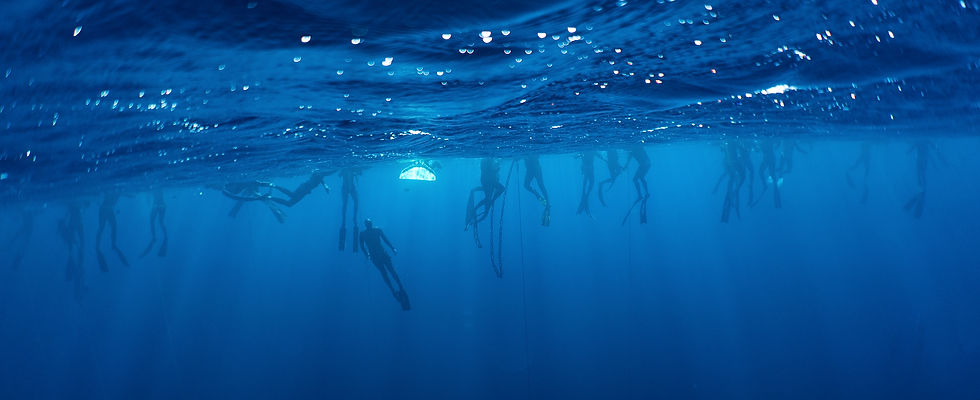freediving research
While breath-hold techniques are often the focus of freedive training, the quality of your everyday breathing may be just as important. As respiratory physiotherapists and freedivers, we've observed that many divers may unknowingly carry dysfunctional breathing patterns outside of their training. This research project aims to investigate how improving everyday breathing mechanics and respiratory muscle strength can enhance both comfort and performance in freediving. By combining clinical assessment tools with real freediving outcomes, we're looking to bring more evidence-based insight into how the way you breathe impacts the way you dive.

About the Researchers
We are two female freedivers and respiratory physiotherapists, certified in the Bradcliff Breathing Method — a specialized approach to functional breathing developed in New Zealand.
This project is a collaboration between our two locations — Bratislava, Slovakia and Tenerife, Canary Islands — and is open to recreational and competitive freedivers who want to deepen their understanding of breathing and support research in this still-developing area of the sport.
What the Research Involves
This six-month study focuses on three key components:
-
A comprehensive assessment of breathing patterns in freedivers
-
Daily-life diaphragmatic breathing retraining
-
Inspiratory muscle training (primarily targeting the diaphragm)
Our starting hypothesis is that many freedivers exhibit some degree of dysfunctional breathing in their everyday lives. We believe that restoring physiological breathing patterns can improve both well-being and freediving performance. Once the breathing pattern and rhythm are optimized, participants will begin targeted inspiratory muscle training — a method known to increase comfort during breath-holds and delay the onset of diaphragm contractions.
What Participation Involves
The research process is structured but flexible. It includes a mix of assessment, breathing retraining, and muscle training sessions, designed to guide you through measurable improvement over 6 months.
Here’s what to expect:
-
Online Questionnaire (approx. 10 minutes)
To be completed before the first session — you can do this anytime online at your convenience. -
Initial Diagnostic Session (approx. 1.5 hours)
Includes a comprehensive individual assessment and the beginning of breathing retraining, primarily in a horizontal position to focus on awareness and control. -
Breathing Practice Session (approx. 50 minutes)
Focused on practicing and automating physiological diaphragmatic breathing — upright and during basic movement. -
Inspiratory Muscle Training (IMT) Session (approx. 50 minutes)
Targeted training to build diaphragm strength and endurance. -
3-Month Retesting (approx. 50 minutes)
Midpoint assessment to track progress. -
6-Month Final Retesting (approx. 50 minutes)
Includes a full comparison of initial and final data.
Remote Participation
For participants traveling from further away, we understand that attending five separate sessions might be challenging. In special cases, it may be possible to combine certain sessions into fewer visits. While this is logistically more demanding, we’ll do our best to accommodate your needs — just get in touch and we’ll talk it through.
What Will Be Measured
Participants will undergo assessments at the beginning, midpoint (3 months), and end (6 months) of the study. In addition to tracking subjective progress, we will use the following objective parameters:
✅ MIP – Maximum Inspiratory Pressure
✅ PEF – Peak Expiratory Flow
✅ MARM – Manual Assessment of Respiratory Motion
✅ Hi-Lo Test – Analysis of movement in primary vs. accessory breathing muscles
✅ Chest circumference – Measured at full inhalation and exhalation
✅ BOLT Test – In two phases: first urge to breathe and onset of diaphragm contractions
✅ Personal Bests – In various freediving disciplines
Locations & Contact
Since we’re based in different parts of the world, the research will take place in two locations:
Bratislava, Slovakia
Contact: Mgr. Veronika Mihalská
📧 info@lactofyz.sk
🌐 www.lactofyz.sk
Tenerife, Canary Islands
Contact: Mgr. Daniela Dvorská
📧 daniela.dvorska@breathetomove.com
🌐 www.breathetomove.com
Ready to Dive In?
If you're a freediver interested in improving your breathing, supporting scientific research, and gaining new tools for your training, we’d love to have you on board.
If you have any questions, feel free to reach out — we’re happy to clarify anything!
Let’s explore what’s possible — one breath at a time.




.png)